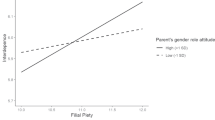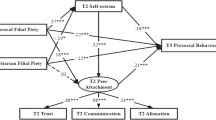Abstract
The theory of filial piety describes important rules dictating how children should treat and take care of their parents. Filial piety has played a crucial role in Chinese society primarily through the influence of Confucianism. Initiated in China in the early 1900s by Chen (1915), the famous New-Culture movement claimed that the authoritarian characteristics of filial piety were the core sources of the damage to the independence of one’s personality; they obstructed one’s freedom of thought, deprived people of equality under the law, and damaged productivity by fostering an excessive dependence. Wu (1917), a famous opponent of Confucianism supported the above points and concluded that filial piety had to be destroyed in China in order for the society to overcome autocratic thinking and to establish a true democracy. In recent decades, several researchers (e.g. Boey 1976; Ho 1994, 1996) have reinforced these arguments by noting that an emphasis on filial piety results in Chinese people having an uncreative character, poor cognitive development, and a negative personality orientation.
Access this chapter
Tax calculation will be finalised at checkout
Purchases are for personal use only
Similar content being viewed by others
References
Boey, K. W. (1976). Rigidity and cognitive complexity: An empirical investigation in the interpersonal, physical, and numeric domains under task-oriented and ego-oriented conditions. Unpublished doctoral dissertation, University of Hong Kong, Hong Kong.
Breckler, S. J., & Greenwald, A. G. (1986). Motivational facets of the self. In E. H. Higgins & R. Sorrentino (Eds.), Handbook of motivation and cognition (pp. 145–164). New York: Guilford Press.
Chen, D.-X. (1915). The fundamental difference between the intellectual traditions of Eastern and Western peoples. La Jeunesse, 1(4), 1–4 (in Chinese).
Cheung, F. M., Leung, K., Zhang, J.-X., Sun, H.-F., Gan, Y.-Q., Song, W.-Z., & Xie, D. (2001). Indigenous Chinese personality constructs: Is the five-factor model complete? Journal of Cross-Cultural Psychology, 32, 407–433.
Grolnick, W. S., Ryan, R. M., & Deci, E. L. (1991). The inner resources for school performance: Motivational mediators of children’s perceptions of their parents. Journal of Educational Psychology, 83, 508–517.
Grolnick, W. S., Deci, E. L., & Ryan, R. M. (1997). Internalization within the family: The self-determination theory perspective. In J. E. Grusec & L. Kuczynski (Eds.), Parenting and children’s internalization of values: A handbook of contemporary theory (pp. 135–161). New York: Wiley.
Ho, D. Y.-F. (1994). Filial piety, authoritarian moralism, and cognitive conservatism in Chinese societies. Genetic, Social, and General Psychology Monographs, 120, 349–365.
Ho, D. Y.-F. (1996). Filial piety and its psychological consequences. In M. H. Bond (Ed.), The handbook of Chinese psychology (pp. 155–165). Hong Kong: Oxford University Press.
Ishii-Kuntz, M. (1997). Intergenerational relationships among Chinese, Japanese, and Korean Americans. Family Relations, 46, 23–32.
Kagitcibasi, C. (1996). Family and human development across cultures: A view from the other side. Hillsdale: Lawrence Erlbaum.
Kashima, E. S., & Hardie, E. A. (2000). The development and validation of the relational, individual, and collective self-aspects. Asian Journal of Social Psychology, 3(1), 19–48.
Kerr, M. E. (1984). Theoretical base for differentiation of self in one’s family of origin. The Clinical Supervisor, 2, 3–36.
Lawrence, R. H., Bennett, J. M., & Markides, K. S. (1992). Perceived intergenerational solidarity and psychological distress among older Mexican-Americans. Journal of Gerontology, 47(2), S55–S65.
Lee, A. E. Y. (1997). Family social support patterns of the Chinese elderly in Beijing, Shanghai, Guangzhou, and Los Angeles: The role of filial piety. Unpublished doctoral dissertation, University of California, Los Angeles.
Little, T. D., Cunningham, W. A., Shahar, G., & Widaman, K. F. (2002). To parcel or not to parcel: Exploring the question, weighing the merits. Structural Equation Modeling, 9, 151–173.
Markus, H. R., & Kitayama, S. (1991). Culture and the self: Implications for cognition, emotion, and motivation. Psychological Review, 98(2), 224–253.
McCrae, R. R., & Costa, P. T. (1997). Personality trait structure as a human universal. Psychological Bulletin, 52, 509–516.
Noom, M. J., Dekovic, M., & Meeus, W. H. J. (2001). Conceptual analysis and measurement of adolescent autonomy. Journal of Youth and Adolescence, 30, 577–595.
Triandis, H. C. (1989). The self and social behavior in differing culture contexts. Psychological Review, 96(3), 506–520.
Wu, Y. (1917). Comment on the basis of absolutism-family system. La Jeunesse, 2(6), 1–4 (in Chinese).
Yeh, K.-H. (1997). Changes in the Taiwanese people’s concept of filial piety. In L. Y. Cheng, Y. H. Lu, & F. C. Wang (Eds.), Taiwanese society in the 1990s (pp. 171–214). Taipei: Institute of Sociology/Academia Sinica (in Chinese).
Yeh, K.-H. (2002). Relationalism: The elements, origins, and changing processes of interpersonal relationships in Chinese society. In C. J. Yeh (Ed.), From modern to indigenous (pp. 229–256). Taipei: Yuan-Liou (in Chinese).
Yeh, K.-H. (2003). The beneficial and harmful effects of filial piety: An integrative analysis. In K. S. Yang, K. K. Hwang, P. B. Pederson, & I. Daibo (Eds.), Progress in Asian social psychology: Conceptual and empirical contributions (pp. 67–82). Westport: Greenwood Publishing Group.
Yeh, K.-H., & Bedford, O. (2003). A test of the dual filial piety model. Asian Journal of Social Psychology, 6(3), 215–228.
Yeh, K.-H., & Bedford, O. (2004). Filial belief and parent-child conflict. International Journal of Psychology, 39(2), 132–144.
Yeh, K.-H., & Yang, Y.-J. (2006). Construct validation of individuating and relating autonomy orientations in culturally Chinese adolescents. Asian Journal of Social Psychology, 9, 148–160.
Yeh, K.-H., Liu, Y.-L., Huang, H.-S., & Yang, Y.-J. (2007). Individuating and relating autonomy in culturally Chinese adolescents. In J. H. Liu, C. Ward, A. B. I. Bernardo, M. Karasawa, & R. Fischer (Eds.), Casting the individual in societal and cultural contexts: Social and societal psychology for Asia and the Pacific (pp. 123–146). Seoul: Kyoyook-Kwahak-Sa Publishing.
Author information
Authors and Affiliations
Corresponding author
Editor information
Editors and Affiliations
Rights and permissions
Copyright information
© 2014 Springer Science+Business Media Dordrecht
About this chapter
Cite this chapter
Yeh, KH. (2014). Filial Piety and Autonomous Development of Adolescents in the Taiwanese Family. In: Poston, Jr., D., Yang, W., Farris, D. (eds) The Family and Social Change in Chinese Societies. The Springer Series on Demographic Methods and Population Analysis, vol 35. Springer, Dordrecht. https://doi.org/10.1007/978-94-007-7445-2_2
Download citation
DOI: https://doi.org/10.1007/978-94-007-7445-2_2
Published:
Publisher Name: Springer, Dordrecht
Print ISBN: 978-94-007-7444-5
Online ISBN: 978-94-007-7445-2
eBook Packages: Humanities, Social Sciences and LawSocial Sciences (R0)




